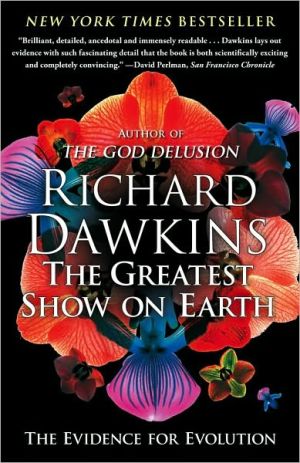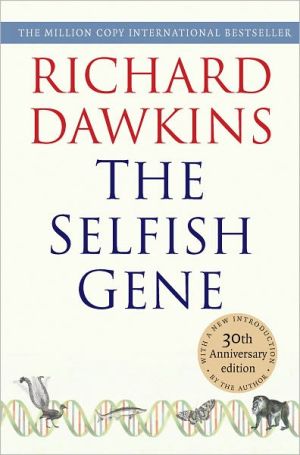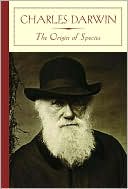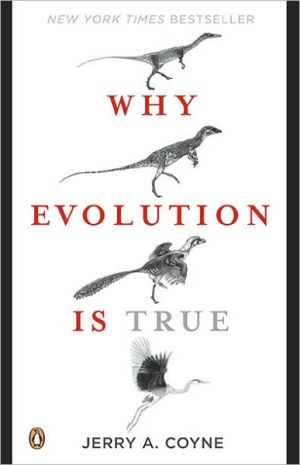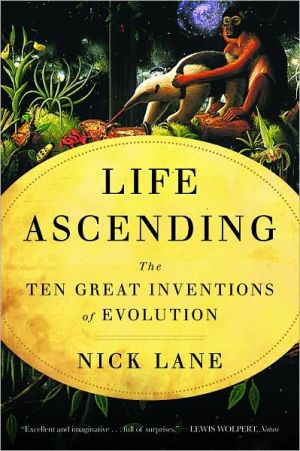The Greatest Show on Earth: The Evidence for Evolution
Richard Dawkins transformed our view of God in his blockbuster, The God Delusion, which sold more than 2 million copies in English alone. He revolutionized the way we see natural selection in the seminal bestseller The Selfish Gene. Now, he launches a fierce counterattack against proponents of "Intelligent Design" in his latest New York Times bestseller, The Greatest Show on Earth. "Intelligent Design" is being taught in our schools; educators are being asked to "teach the controversy" behind...
Search in google:
Richard Dawkins transformed our view of God in his blockbuster, The God Delusion, which sold more than 2 million copies in English alone. He revolutionized the way we see natural selection in the seminal bestseller The Selfish Gene. Now, he launches a fierce counterattack against proponents of "Intelligent Design" in his latest New York Times bestseller, The Greatest Show on Earth. "Intelligent Design" is being taught in our schools; educators are being asked to "teach the controversy" behind evolutionary theory. There is no controversy. Dawkins sifts through rich layers of scientific evidence—from living examples of natural selection to clues in the fossil record; from natural clocks that mark the vast epochs wherein evolution ran its course to the intricacies of developing embryos; from plate tectonics to molecular genetics—to make the airtight case that "we find ourselves perched on one tiny twig in the midst of a blossoming and flourishing tree of life and it is no accident, but the direct consequence of evolution by non-random selection." His unjaded passion for the natural world turns what might have been a negative argument, exposing the absurdities of the creationist position, into a positive offering to the reader: nothing less than a master’s vision of life, in all its splendor. Publishers Weekly Reviewed by Jonah Lehrer Richard Dawkins begins The Greatest Show on Earth with a short history of his writing career. He explains that all of his previous books have naïvely assumed “the fact of evolution,” which meant that he never got around to laying “out the evidence that it [evolution] is true.” This shouldn't be too surprising: science is an edifice of tested assumptions, and just as physicists must assume the truth of gravity before moving on to quantum mechanics, so do biologists depend on the reality of evolution. It's the theory that makes every other theory possible. Yet Dawkins also came to realize that a disturbingly large percentage of the American and British public didn't share his enthusiasm for evolution. In fact, they actively abhorred the idea, since it seemed to contradict the Bible and diminish the role of God. So Dawkins decided to write a book for these “history-deniers,” in which he would dispassionately demonstrate the truth of evolution “beyond sane, informed, intelligent doubt.” After only a few pages of The Greatest Show on Earth, however, it becomes clear that Dawkins doesn't do dispassionate, and that he's not particularly interested in convincing believers to believe in evolution. He repeatedly compares creationists and Holocaust deniers, which is a peculiar way of reaching out to the other side. Elsewhere, Dawkins calls those who don't subscribe to evolution “ignorant,” “fatuously ignorant” and “ridiculous.” All of which raises the point: who, exactly, is supposed to read this book? Is Dawkins preaching to the choir or trying to convert theuninformed? While The Greatest Show on Earth might fail as a work of persuasive rhetoric—Dawkins is too angry and acerbic to convince his opponents—it succeeds as an encyclopedic summary of evolutionary biology. If Charles Darwin walked into a 21st-century bookstore and wanted to know how his theory had fared, this is the book he should pick up. Dawkins remains a superb translator of complex scientific concepts. It doesn't matter if he's spinning metaphors for the fossil record (“like a spy camera” in a murder trial) or deftly explaining the method by which scientists measure the genetic difference between distinct species: he has a way of making the drollest details feel like a revelation. Even if one already believes in the survival of the fittest, there is something thrilling about learning that the hoof of a horse is homologous to the fingernail of the human middle finger, or that some dinosaurs had a “second brain” of ganglion cells in their pelvis, which helped compensate for the tiny brain in their head. As Darwin famously noted, “There is grandeur in this view of life.” What Dawkins demonstrates is that this view of life isn't just grand: it's also undeniably true. Color illus. (Sept. 29) Jonah Lehrer is the author of How We Decide and Proust Was a Neuroscientist.
\ From Barnes & Noble"Darwin's Rottweiler" is at it again. Richard Dawkins, the author of The God Delusion, returns with a comprehensive examination of the current state of evidence for evolution. Unlike the aforementioned book, which described religion as a virus of the mind, The Greatest Show on Earth is not primarily about the absence of a supreme being, but rather about the mechanics of species change and diversification. Dawkins draws on his expertise as an evolutionary biologist to describe how the science of the past two centuries has confirmed and refined Darwinian theory. An important scientific work certain to garner major reviews. Now in paperback. (Hand-selling tip: This Dawkins' most affirmative, accessible book.)\ \ \ \ \ Publishers WeeklyReviewed by Jonah Lehrer \ Richard Dawkins begins The Greatest Show on Earth with a short history of his writing career. He explains that all of his previous books have naïvely assumed “the fact of evolution,” which meant that he never got around to laying “out the evidence that it [evolution] is true.” This shouldn't be too surprising: science is an edifice of tested assumptions, and just as physicists must assume the truth of gravity before moving on to quantum mechanics, so do biologists depend on the reality of evolution. It's the theory that makes every other theory possible.\ Yet Dawkins also came to realize that a disturbingly large percentage of the American and British public didn't share his enthusiasm for evolution. In fact, they actively abhorred the idea, since it seemed to contradict the Bible and diminish the role of God. So Dawkins decided to write a book for these “history-deniers,” in which he would dispassionately demonstrate the truth of evolution “beyond sane, informed, intelligent doubt.”\ After only a few pages of The Greatest Show on Earth, however, it becomes clear that Dawkins doesn't do dispassionate, and that he's not particularly interested in convincing believers to believe in evolution. He repeatedly compares creationists and Holocaust deniers, which is a peculiar way of reaching out to the other side. Elsewhere, Dawkins calls those who don't subscribe to evolution “ignorant,” “fatuously ignorant” and “ridiculous.”\ All of which raises the point: who, exactly, is supposed to read this book? Is Dawkins preaching to the choir or trying to convert theuninformed? While The Greatest Show on Earth might fail as a work of persuasive rhetoric—Dawkins is too angry and acerbic to convince his opponents—it succeeds as an encyclopedic summary of evolutionary biology. If Charles Darwin walked into a 21st-century bookstore and wanted to know how his theory had fared, this is the book he should pick up.\ Dawkins remains a superb translator of complex scientific concepts. It doesn't matter if he's spinning metaphors for the fossil record (“like a spy camera” in a murder trial) or deftly explaining the method by which scientists measure the genetic difference between distinct species: he has a way of making the drollest details feel like a revelation. Even if one already believes in the survival of the fittest, there is something thrilling about learning that the hoof of a horse is homologous to the fingernail of the human middle finger, or that some dinosaurs had a “second brain” of ganglion cells in their pelvis, which helped compensate for the tiny brain in their head. As Darwin famously noted, “There is grandeur in this view of life.” What Dawkins demonstrates is that this view of life isn't just grand: it's also undeniably true. Color illus. (Sept. 29)\ Jonah Lehrer is the author of How We Decide and Proust Was a Neuroscientist.\ \ \ \ Library JournalIn books such as The Selfish Gene, The Blind Watchmaker, and Climbing Mount Improbable, Dawkins has contributed significantly to the public understanding of evolutionary theory. Here, he backtracks, offering not a discussion of the magnificence of the evolutionary view of life but several basic proofs of its validity. He argues that this is necessary because of recent assaults from creationists upon the very concept of evolution by natural selection. There are many books that address the need of better informing the public about why the theory is essential, e.g., David Sloan Wilson's Evolution for Everyone and Jerry A Coyne's Why Evolution Is True. Dawkins has an influential voice in the debate, so the broadsides that he launches against creationists in this book will certainly cheer his many fans. However, he seems to be primarily preaching to the choir and probably won't win converts (a metaphor that Dawkins, an atheist and author of The God Delusion, might find objectionable). VERDICT The author's name will guarantee a readership, but the sincerely curious and undecided would benefit more from other recent titles.—Gregg Sapp, Evergreen State Coll. Lib., Olympia, WA\ \ \ \ \ Kirkus ReviewsLook out, creationists. There's a new sheriff in town, and he talks like an Oxford don. In fact, Dawkins (The God Delusion, 2007, etc.) gave up the Oxford chair in the Public Understanding of Science in order to write full-time, and to spend more time agitating against antiscience and pseudoscience. The author opens with guns a-blazing, demanding what we might think of a Latin teacher's being forced to prove that the Romans ever existed and, more provocatively, a history teacher's having to give equal time to Holocaust deniers: "Fashionably relativist intellectuals chime in to insist that there is no absolute truth: whether the Holocaust happened is a matter of personal belief; all points of view are equally valid and should be equally ‘respected.' " Nonsense and balderdash, cries Dawkins, adding, against those who deny the factuality of evolution, "Evolution is a fact in the same sense as it is a fact that Paris is in the Northern Hemisphere." As such, it would seem that the battle for evolution should have long been over, but there are still deniers aplenty. For them, Dawkins provides careful explication of selection-natural, adaptive, human-induced et al.-and of evolutionary notions such as the (much misquoted) survival of the fittest. The author writes with terrific wit ("Cabbages are a vegetable affront to essentialism and the immutability of species") and considerable learning, but what is interesting here is his fire. Without the strictures of academia, it seems, he relishes the opportunity to light into his opponents. Whether anyone will stand up to refute his notions remains to be seen, but for now Dawkins wins on points. A pleasure in the face of so much scientificignorance-biology rendered accessible and relevant to the utmost degree.\ \
